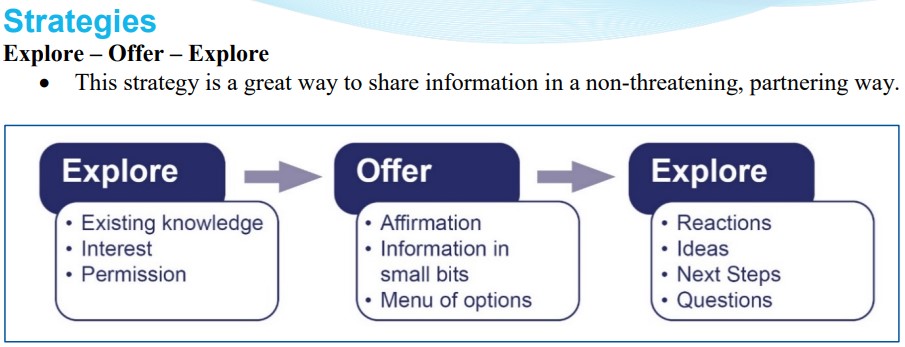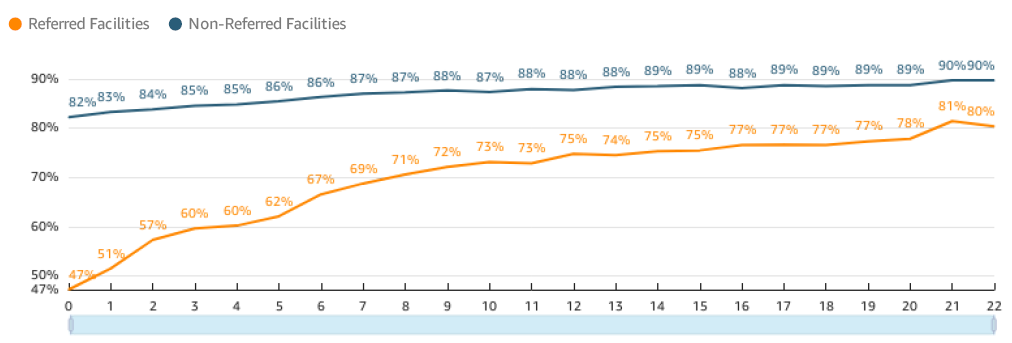In January 2022, a nursing home that had previously received technical assistance from Superior Health Quality Alliance (Superior Health) to improve nursing home resident COVID-19 initial vaccination series rates was referred again to Superior Health for assistance with improving its resident COVID-19 booster rate. The nursing home demonstrated an 85.3 percent net increase in resident booster rates reported in the National Healthcare Safety Network (NHSN) database from when the facility was referred to Superior Health for booster assistance on January 9, 2022, through April 24, 2022.
During initial meetings with nursing home leadership, Superior Health, a Centers for Medicare & Medicaid Services (CMS) Quality Innovation Network-Quality Improvement Organization (QIN-QIO), identified two primary challenges: 1) nursing home residents and their families, as well as nursing home staff, continued to exhibit hesitancy about COVID-19 vaccinations and boosters, and 2) as a result of staff turnover, the nursing home administration needed additional training and support to accurately enter and track vaccinations and boosters in the NHSN database.
A Plan to Cultivate Trust and Address Vaccine Hesitancy

Excerpt from Motivational Interviewing Strategies for Vaccine Readiness Tip Sheet,
Superior Health Quality Alliance
When Superior Health began their initial work with the nursing home in the summer of 2021, they discovered that nursing home staff as well as residents and their families expressed significant hesitancy about the COVID-19 vaccine; these concerns continued to persist and affected COVID-19 booster rates. The facility’s root cause analysis revealed that most of the staff and residents were African American and were aware of and affected by historical trauma related to past treatment of African Americans in health research studies. Many expressed distrust in medical research and in health care systems and shared concerns that they had been selected to receive the COVID-19 vaccine because of their race. In addition, many of the younger nursing home staff expressed concerns that the vaccine would negatively affect their fertility or their ability to carry a pregnancy to term.
Superior Health invited the nursing home to participate in a webinar panel, titled Focus on Vaccine Acceptance/ Hesitancy in Health Care Personnel, to discuss their challenges and openly share their concerns. Superior Health also encouraged the nursing home to continue working through staff and resident vaccine hesitancy via participation in a weekly webinar series with other nursing home peers called the Nursing Home Leadership COVID-19 Roundtable. During the series, the nursing home participated in educational sessions and discussed strategies for disseminating current information about the vaccine and booster and to address hesitancy and other barriers.
Superior Health also distributed information about Motivational Interviewing. One of Superior Health’s staff members is a member of the Motivational Interviewing Network of Trainers (MINT) and provided in-depth consultation as well as supplemental materials to the nursing home, including the tip sheet Motivational Interviewing Strategies for Vaccine Readiness. The information was well-received by nursing home staff and was an effective intervention for listening to the concerns of staff, residents, and families and for developing trusting relationships.

Excerpt from Adapting Fact-Based Information to the Needs of Communities, National Institutes of Health
To reinforce factual information about the vaccine and booster, Superior Health developed a personalized education plan that included handouts and posters that could be displayed in the facility. The most useful resources included:
- Myths and Facts about COVID-19 Vaccines | CDC
- How to Address COVID-19 Vaccine Misinformation | CDC
- How to Address COVID-19 Vaccine Misconceptions | WECANDOTHIS.HHS.GOV
- COVID-19 Vaccines and Pregnancy: Conversation Guide
- Adapting Fact-Based Information to the Needs of Communities (nih.gov)
- Adaptar la información basada en hechos a las necesidades de las comunidades (nih.gov) (Spanish)
Maintaining Current and Accurate Data, a Public Health Approach
Superior Health identified on ongoing need for NHSN training and technical assistance as a result of staff turnover. The QIN-QIO worked closely with the nursing home to answer questions and to assist them in maintaining a process to keep NHSN data up to date. Superior Health has found this education and support to be an invaluable public health service and important for maintaining clear and accurate data to drive interventions that support the uptake of COVID-19 vaccinations and boosters.
Person-Centered Approach is the Key to Lasting Change
Superior Health credits the nursing home’s person-centered approach as key to rebuilding trust and creating lasting, sustainable change. The Superior Health team formed close bonds with nursing home staff and leadership who were deeply engaged in the work of improving their vaccination and booster rates. The nursing home found Superior Health’s technical assistance, educational resources and support, combined with one-on-one conversations with key medical staff and leadership, a helpful and effective method to reach frontline staff, residents and families. This support also helped the nursing home build trusting relationships that led to increased acceptance of the vaccine.
All nursing homes in the three-state region served by Superior Health and referred to the QIN-QIO for assistance between January 9, 2022, and May 29, 2022, saw a 21.4 percent net increase in resident vaccination/booster rates compared to nursing homes in the same region that were not referred to Superior Health for assistance. In addition, the percentage of fully vaccinated and boosted residents at nursing homes referred to Superior Health for assistance during that time increased by 33 percent, compared to the percentage of fully vaccinated and boosted residents at nursing homes that were not referred to the QIN-QIO, which increased by only 8 percent.
Superior Health Quality Alliance’s Regional Nursing Home Resident COVID-19 Vaccination/Booster Rates Including
Referrals from January 9 through May 29, 2022.
The graph compares vaccination rates of CMS-referred facilities (orange) with never-referred facilities (blue) and only includes referrals made between January 9 and May 29, 2022. Never-referred facilities did not meet initial criteria for booster referral because CMS focused on facilities with significantly lower rates.

This material was prepared by The Bizzell Group (Bizzell), the Data Validation and Administrative (DVA) contractor, under contract with the Centers for Medicare & Medicaid Services (CMS), an agency of the U.S. Department of Health and Human Services (HHS). Views expressed in this material do not necessarily reflect the official views or policy of CMS or HHS, and any reference to a specific product or entity herein does not constitute endorsement of that product or entity by CMS or HHS. 12SOW/Bizzell/DVA-1123-07/18/2023

